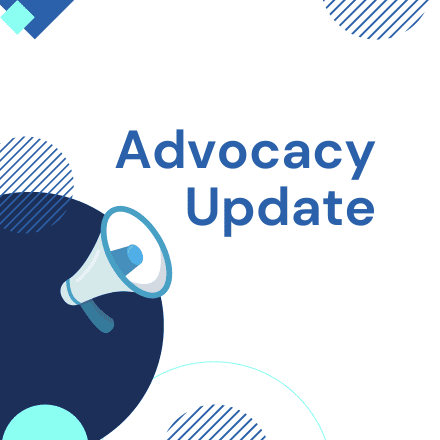As the premier organization focused on the well-being of college students, the American College Health Association (ACHA) works to advance policies that will benefit the higher education health and well-being community. One of the ways we work toward this goal is by endorsing pieces of federal legislation, either when asked by members of Congress to do so or through offering our endorsement. Before any legislation is endorsed by the association, the ACHA Advocacy Committee analyzes and compares it with the ACHA Policy Platform, which the ACHA Board approves annually. The Policy Platform outlines the range of policy areas and positions ACHA takes. Any policy-related activities of ACHA, including endorsing legislation, must fit within the Policy Platform, and select members/member groups are often solicited for their input based on their expertise and interests.
As of September 2024, ACHA has endorsed five pieces of federal legislation currently under consideration by lawmakers on Capitol Hill. They are:
College hazing reporting bills, “Stop Campus Hazing Act” (HR 5646/S2901)
Sponsors: Rep. Lucy McBath (D-GA) & Sen. Amy Klobuchar (D-MN)
Summary: Would require colleges that participate in federal student aid programs to report hazing incidents that have occurred on campus through an annual report. Colleges would also have to develop policies on providing comprehensive hazing prevention.
Cosponsors: The House version has 57 (38 Democrats, 19 Republicans), while the Senate version has 13 (7 Republicans, 5 Democrats, 1 Independent)
Status: The House version passed the House Education and Workforce Committee and is eligible for full House consideration; the Senate version is awaiting consideration in the Senate Health, Education, Labor, and Pensions Committee.
Medical services language interpretation services task force bill, “SPEAK Act” (HR 6033)
Sponsor: Rep. Michelle Steel (R-CA)
Summary: Would require the U.S. Department of Health and Human Services to create a task force to make recommendations to improve access to healthcare information for non-English speakers to be issues in the Best Practices for addressing populations that do not speak English.
Cosponsors: 29 (22 Democrats, 7 Republicans)
Status: Passed in the House and referred to Senate Health Education, Labor and Pensions Committee
Campus Prevention and Recovery Services for Students Act (HR 9214)
Sponsor: Rep. Teresa Leger Fernandez (D-NM)
Summary: Would update current federal programs regarding college alcohol and substance misuse from requiring colleges to have “a program to prevent the misuse of alcohol and other illicit drugs by students and employees” to requiring them to have “an evidence-informed program to prevent alcohol and substance misuse by students and employees.” The bill would also create an interagency between the US Department of Education and the US Department of Health and Human Services to guide and promote implementation. The previous version of this bill was numbered HR 6493 during the 117th Congress.
Cosponsors: 7 (all Democrats)
Status: Awaiting consideration by the House Education and the Workforce Committee
Child Care Access Means Parents in Schools (CCAMPIS) Reauthorization Act (HR 9559/S 5033)
Sponsors: Rep. Katherine Clark (D-MA) & Sen. Tammy Duckworth (D-IL)
Summary: Would reintroduce the CCAMPIS program and increase the funding level authorized for the program. Specifically, it would:
- Reauthorize the CCAMPIS program through the fiscal year 2030, with an annual minimum funding level of $500 million (up from $75 million in FY24 funding), while increasing the annual minimum and maximum individual grant award levels to $75,000 (up from $30,000 in current law) and $2 million, respectively
- Connect parenting students served by CCAMPIS with other nutrition, housing, and health care support services by requiring college applicants to ensure “that the institution will assist student parents receiving childcare services” in “enrolling in Federal, State, Tribal, or local means-tested benefits programs for which they may be eligible,” including:
-
- Medicaid
- Refundable credit for coverage under a qualified health plan
- SNAP
- SSI
- TANF
- WIC
- Federal housing assistance programs including tenant-based rental assistance
- Federal childcare assistance programs under the Child Care and Development Block Grant Act
- Free and reduced-price school lunch program
- EITC
- Child Tax Credit
- Require the collection of disaggregated data on the parenting students served by CCAMPIS grant recipients.
Cosponsors: The House version has 5 (all Democrats), while the Senate version has 14 (all Democrats)
Status: The House version was recently introduced and is awaiting consideration in the House Education and Workforce Committee; the Senate version was introduced and is awaiting consideration in the Senate Education, Labor, and Pensions Committee.
Higher Education Grant Flexibility Act (S 4379)
Sponsor: Sen. Bob Casey (D-PA)
Summary: Would make changes to the Federal Pell Grant, Teacher Education Assistance for College and Higher Education (TEACH), and Federal Supplemental Education Opportunity Grant (FSEOG) programs to allow reasonable accommodations related to course credit and semester limits for students with disabilities while maintaining academic progress.
Cosponsors: 2 (both Democrats)
Status: Awaiting consideration in the Senate Health, Education, Labor and Pensions Committee
ACHA is constantly monitoring legislation at the federal and state levels. If you hear about legislation that you think ACHA should be aware of and/or consider endorsing or have questions about legislation or any other policy and advocacy matters, please feel free to email advocacy@acha.org to share with the ACHA advocacy team.







